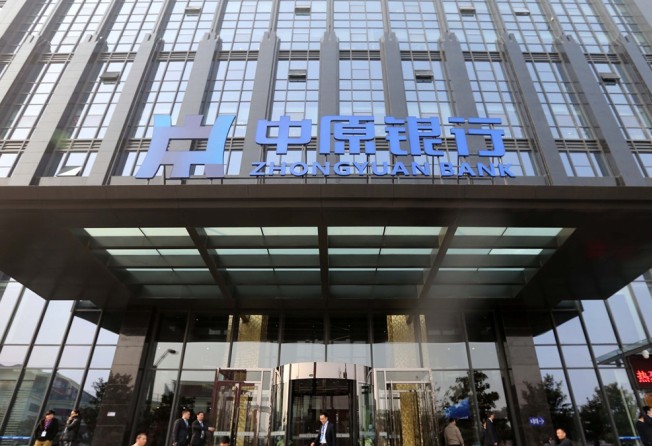Zhongyuan shares make sluggish debut in Hong Kong after investors spurn bank’s IPO
Stock closes at HK$2.49, up 1.6 pc from its IPO price

Zhongyuan Bank, the biggest city lender in central China, made a sluggish debut on the Hong Kong stock exchange, after investors gave the city’s third-biggest initial public offering of 2017 the cold shoulder.
The bank’s shares ended Wednesday at HK$2.49 each, 1.6 per cent above the IPO price of HK$2.45.
More than 34 million shares changed hands, with a total turnover of HK$85 million.
The bank, based in the Henan provincial capital of Zhengzhou in central China, had already priced its offer near the bottom of an expected price range of between HK$2.42 and HK$2.53. Still, it was only able to generate enough interest from retail investors to bid for 39 per cent of the shares on offer, making it one of the worst new listings this year in the city. The bank did raise HK$7.12 billion from its IPO.
Guotai Junan Securities holds the top spot for financial IPOs this year, raising more than HK$16 billion in April, followed by Guangzhou Rural Commercial Bank’s HK$7.163 billion IPO.
Analysts said Chinese regional banks are not a favourite of Hong Kong investors, who are concerned about China’s rising debt levels amid an economic slowdown and the ongoing regulatory crackdown on financial leverage.
“Hong Kong investors are not very interested in such stocks,” said Ben Kwong, executive director for KGI Asia.
“Even if they want to choose Chinese bank stocks, they prefer big lenders, which are more liquid and have a wider banking network and broader business base.”
Previously, a number of Chinese regional lenders have received a lacklustre response from Hong Kong investors.
In June, Guangzhou Rural Commercial Bank, the biggest rural lender in southern Guangdong province, saw just 45 per cent of its new shares subscribed by retail investors. As of Wednesday morning, the stock was still trading below the IPO price of HK$5.1.
In November 2015, Jinzhou Bank, based in northeastern Liaoning province, registered a 4 per cent subscription rate for the retail tranche of its IPO.
Zhongyuan Bank’s valuation is more expensive than its peers, analysts said.
“It’s not a special stock to Hong Kong investors, as there are already a number of Chinese urban and rural lenders in the market,” said Zhao Hongmei, an analyst with Zhongtai Securities. “Compared with peers, its valuation is not attractive.”
Based on 2016 financial figures, Zhongyuan Bank’s price-to-book (P/B) ratio is between 1.22 and 1.25, according to estimates by Zhongtai Securities.
Currently, the P/B ratios for Hong Kong-listed Chinese regional banks are between 0.7 to 1.1.
Zhongyuan Bank’s bad debt levels pose another potential concern.
“The bank’s non-performing loan ratio is higher than the industry average. Its loan loss provision coverage ratio is also lower than its peers,” said Zhao.
Zhongyuan Bank’s non-performing loan ratio reached 1.92 per cent, 1.95 per cent, and 1.86 per cent in 2014, 2015 and 2016 respectively.
The industry average for Chinese lenders was 1.74 per cent at the end of 2016.
Zhao said the bank’s debtors are mostly in the manufacturing and retail sectors, which are more exposed to China’s economic slowdown.
Zhongyuan Bank was established in December 2014 through the merger of 13 smaller city banks in Henan province.
Hence it has “inherited some low-quality assets”, dragging on the profitability, said Zhao.
By the end of 2016, Zhongyuan Bank’s total assets amounted to 433.1 billion yuan. Its net interest income reached 11.2 billion yuan, up 6.7 per cent from a year earlier, and profit increased 11.6 per cent year-on-year to 3.36 billion yuan.
Joint sponsors of the IPO included Citic CLSA, JP Morgan, CCB International, and CMB International.
The largest shareholder is state-owned Henan Investment Group, which holds a 9 per cent stake, according to the prospectus.
The bank has introduced several cornerstone investors, including Tian Kun Investment, Shanghai Huaxin Group, and China Create Capital.